Answered step by step
Verified Expert Solution
Question
1 Approved Answer
Read the Case Study: Nortel Networks Corporation: Ethical missteps. After reading the case study, describe the ethical breach that was entered into by leadership at
Read the Case Study: Nortel Networks Corporation: Ethical missteps.
- After reading the case study, describe the ethical breach that was entered into by leadership at Nortel.
- Use the three components of the Fraud Triangle to evaluate the actions of the leadership.
- Describe how the tone at the top contributed to this fraudulent activity.
- How did the Audit Committee and Board fail in their responsibilities?
- Describe how various stakeholders (employees, stockholders, and the community) would have been affected by the actions of those in leadership.
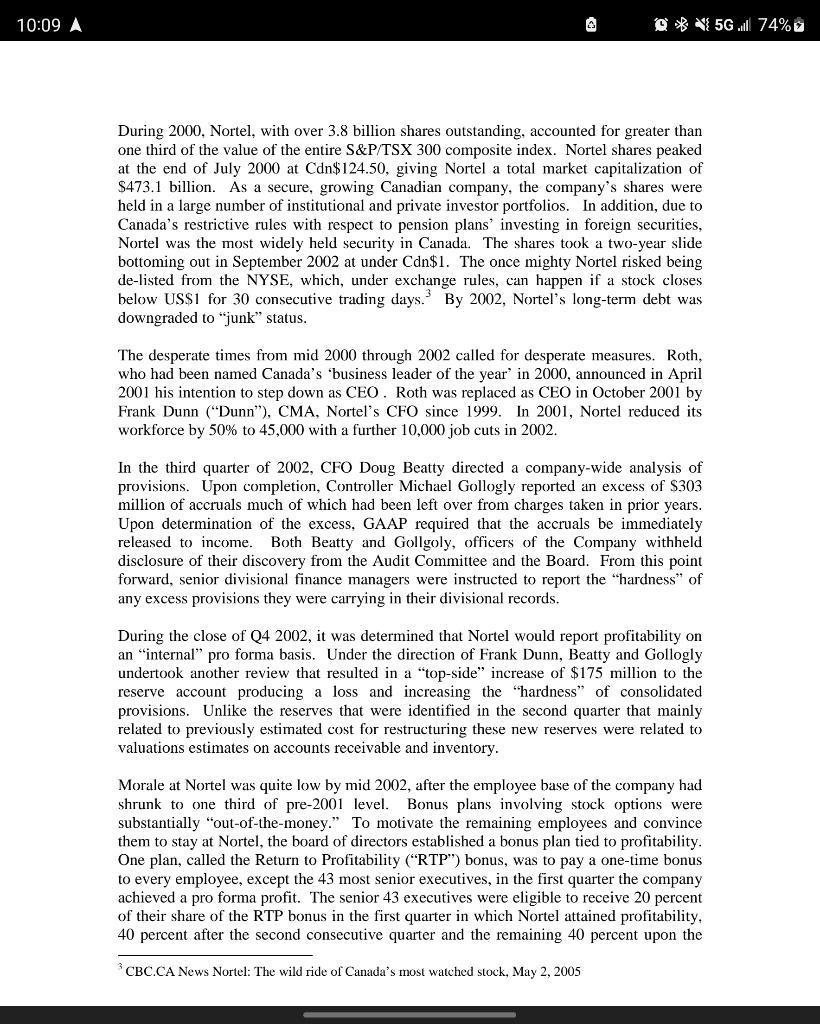
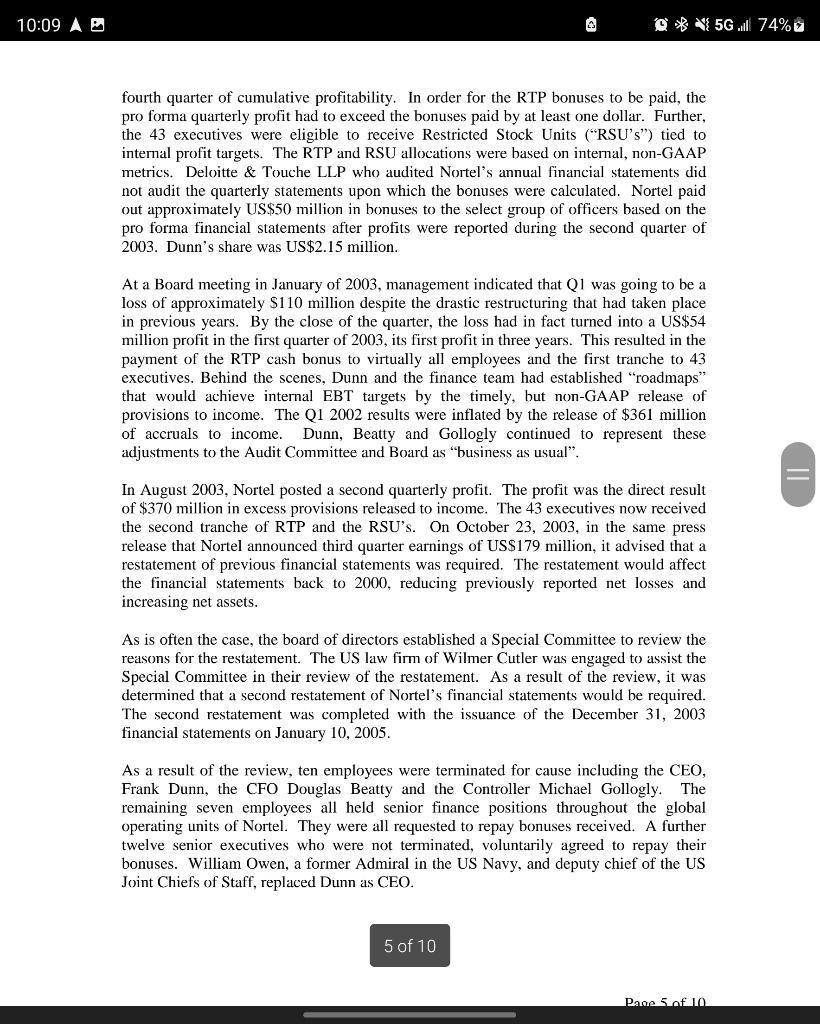
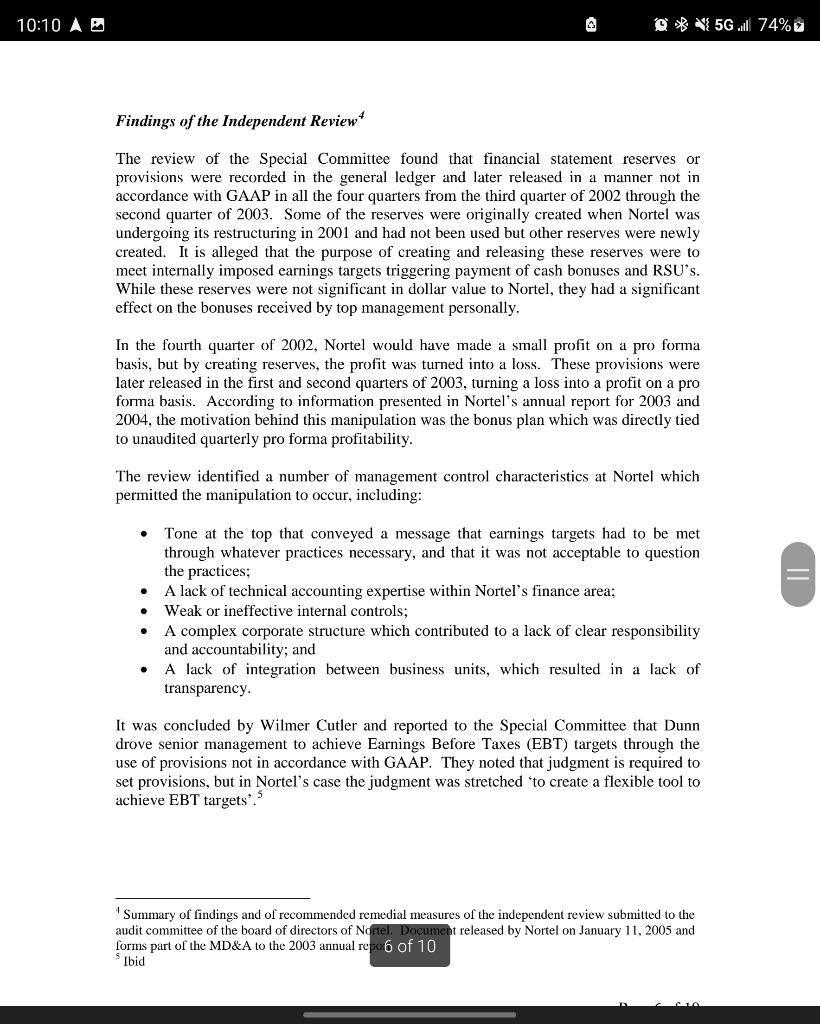
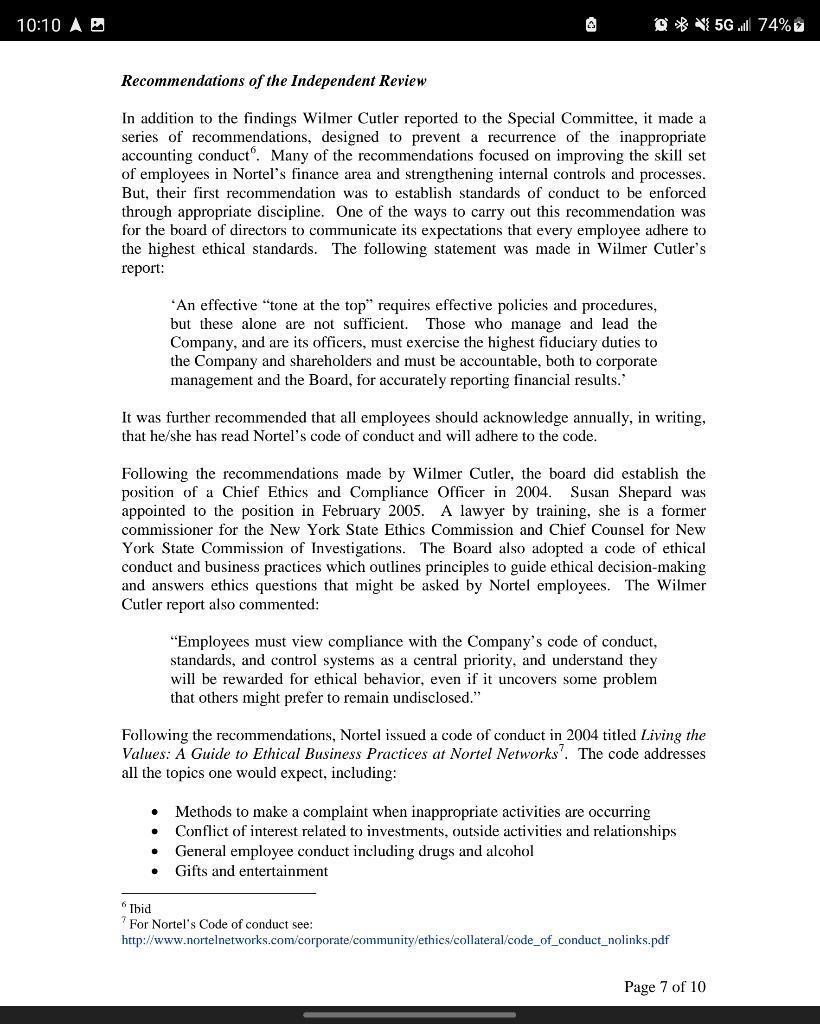
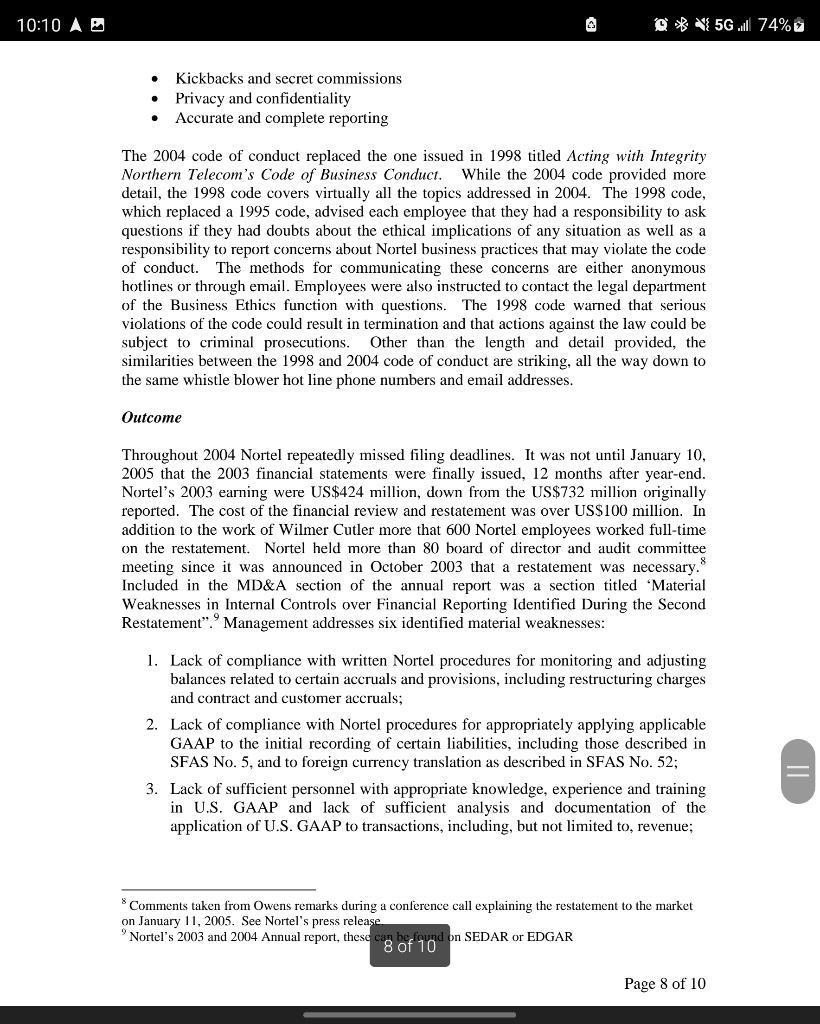
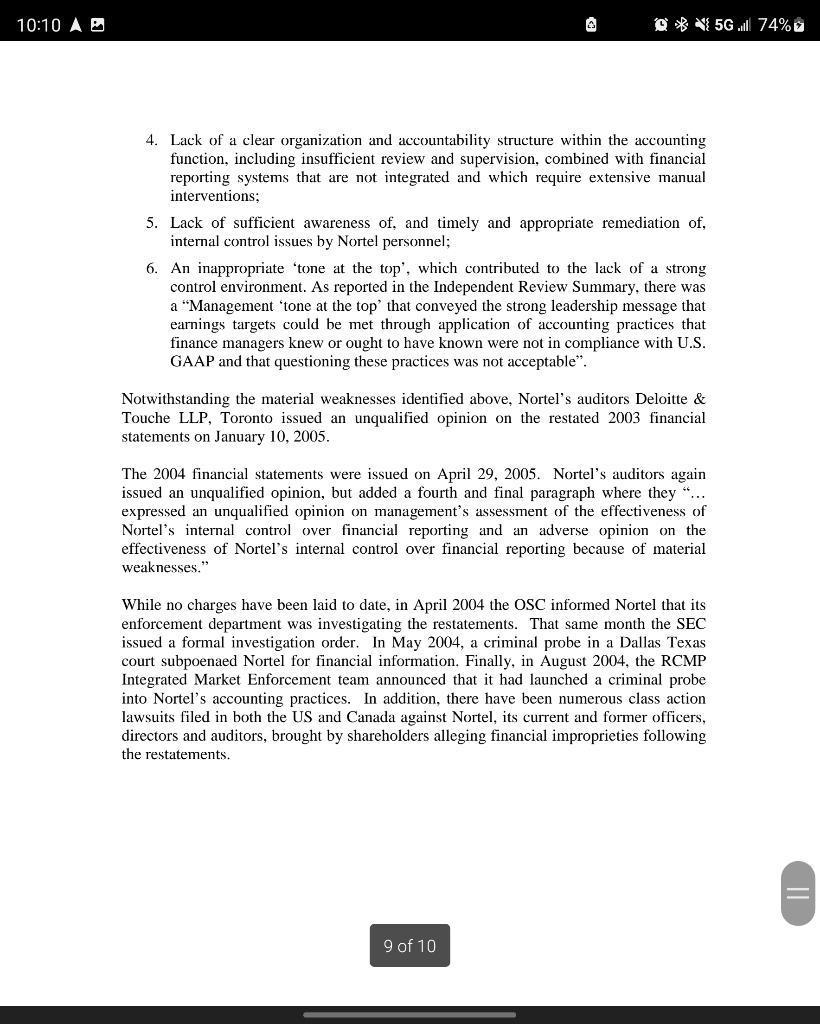
10:09 A O * N 5G ill 74% During 2000, Nortel, with over 3.8 billion shares outstanding, accounted for greater than one third of the value of the entire S&P/TSX 300 composite index. Nortel shares peaked at the end of July 2000 at Cdn$124.50, giving Nortel a total market capitalization of $473.1 billion. As a secure, growing Canadian company, the company's shares were held in a large number of institutional and private investor portfolios. In addition, due to Canada's restrictive rules with respect to pension plans' investing in foreign securities, Nortel was the most widely held security in Canada. The shares took a two-year slide bottoming out in September 2002 at under Cdn$1. The once mighty Nortel risked being de-listed from the NYSE, which, under exchange rules, can happen if a stock closes below US$1 for 30 consecutive trading days. By 2002, Nortel's long-term debt was downgraded to "junk" status. The desperate times from mid 2000 through 2002 called for desperate measures. Roth, who had been named Canada's 'business leader of the year' in 2000, announced in April 2001 his intention to step down as CEO. Roth was replaced as CEO in October 2001 by Frank Dunn ("Dunn"), CMA, Nortel's CFO since 1999. In 2001, Nortel reduced its workforce by 50% to 45,000 with a further 10,000 job cuts in 2002. In the third quarter of 2002, CFO Doug Beatty directed a company-wide analysis of provisions. Upon completion, Controller Michael Gollogly reported an excess of $303 million of accruals much of which had been left over from charges taken in prior years. Upon determination of the excess, GAAP required that the accruals be immediately released to income. Both Beatty and Gollgoly, officers of the Company withheld disclosure of their discovery from the Audit Committee and the Board. From this point forward, senior divisional finance managers were instructed to report the "hardness" of any excess provisions they were carrying in their divisional records. During the close of Q4 2002, it was determined that Nortel would report profitability on an "internal" pro forma basis. Under the direction of Frank Dunn, Beatty and Gollogly undertook another review that resulted in a "top-side" increase of $175 million to the reserve account producing a loss and increasing the "hardness" of consolidated provisions. Unlike the reserves that were identified in the second quarter that mainly related to previously estimated cost for restructuring these new reserves were related to valuations estimates on accounts receivable and inventory. Morale at Nortel was quite low by mid 2002, after the employee base of the company had shrunk to one third of pre-2001 level. Bonus plans involving stock options were substantially "out-of-the-money." To motivate the remaining employees and convince them to stay at Nortel, the board of directors established a bonus plan tied to profitability. One plan, called the Return to Profitability ("RTP") bonus, was to pay a one-time bonus to every employee, except the 43 most senior executives, in the first quarter the company achieved a pro forma profit. The senior 43 executives were eligible to receive 20 percent of their share of the RTP bonus in the first quarter 40 percent after the second consecutive quarter and the remaining 40 percent upon the which Nortel attained profitability, CBC.CA News Nortel: The wild ride of Canada's most watched stock, May 2, 2005
Step by Step Solution
★★★★★
3.33 Rating (153 Votes )
There are 3 Steps involved in it
Step: 1
1 After reading the case study describe the ethical breac...
Get Instant Access to Expert-Tailored Solutions
See step-by-step solutions with expert insights and AI powered tools for academic success
Step: 2

Step: 3

Ace Your Homework with AI
Get the answers you need in no time with our AI-driven, step-by-step assistance
Get Started


